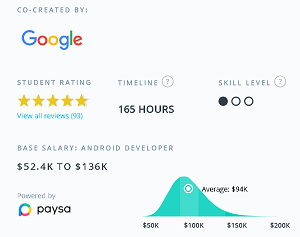News
In Turbulent Times, Google Offers Free Android Courses
- By David Ramel
- June 28, 2016
Amid turbulent times for the Android ecosystem, Google is enticing new developers into its mobile OS fold through free beginner training courses presented via Udacity. The company also just announced an education program for even younger students called Project Bloks that uses "physical coding" to teach computer basics to children.
After dodging concerns about the legality of the Java language used for programming Android, Google has matched Apple's recent monetary catering to developers in the face of multiple media articles announcing the end of the mobile app boom -- while a recent report indicated the iOS App Store generated almost twice as much revenue as did Google Play in the first quarter.
With all that happening, Google is inviting newbie developers to jump on the Android bandwagon. Google last week introduced the Android Basics Nanodegree program offered in partnership with training site Udacity, targeting new developers even if they have little or no programming experience.
While that degree program is offered with a free one-week trial before $199 monthly pricing kicks in, Google said in a blog post that "all of the individual courses that make up this Nanodegree are available online for no charge at udacity.com/google." Udacity also offers paid services including coaching, guidance and counseling along with its program completion certificate.
 [Click on image for larger view.]
Android Basics Nanodegree on Udacity (source: Udacity)
[Click on image for larger view.]
Android Basics Nanodegree on Udacity (source: Udacity)
Using Google's official IDE, Android Studio, and writing in Java, students learn to build apps such as an order form, a pet tracker, a Native American vocabulary app and a recent earthquake app.
"Android apps are everywhere, and learning to build them can be a fantastic career move," the Udacity site says. "No programming experience? No problem! The skills you learn in this beginning Nanodegree program will accelerate your journey to becoming a working Android Developer. Learn the Java language, and start building amazing new apps for those billion (and counting!) Android devices!"
Google said the courses teach students how to:
-
Build app user interfaces.
- Implement user interactions.
- Store information in a database.
- Pull data from the internet into your app.
- Identify and fix unexpected behavior in the app.
- Localize your app to support other languages.
After completing the introductory Nanodegree program, students have the option of continuing with further coursework for intermediate developers to earn a Career-track Android Nanodegree.
To woo even younger coders, Google just yesterday announced Project Bloks: Making code physical for kids, a research collaboration between Google, Paulo Blikstein (Stanford University) and IDEO with the goal of creating an open hardware platform that researchers, developers and designers can use to build physical coding experiences."
Featuring "physical coding," the new program joins other Google programming education efforts such as Blockly, Scratch Blocks, CS First and Made w/ Code.
"At Google, we're passionate about empowering children to create and explore with technology," Google said in a blog post announcing Project Bloks. "We believe that when children learn to code, they're not just learning how to program a computer -- they're learning a new language for creative expression and are developing computational thinking: a skillset for solving problems of all kinds."
About the Author
David Ramel is an editor and writer at Converge 360.